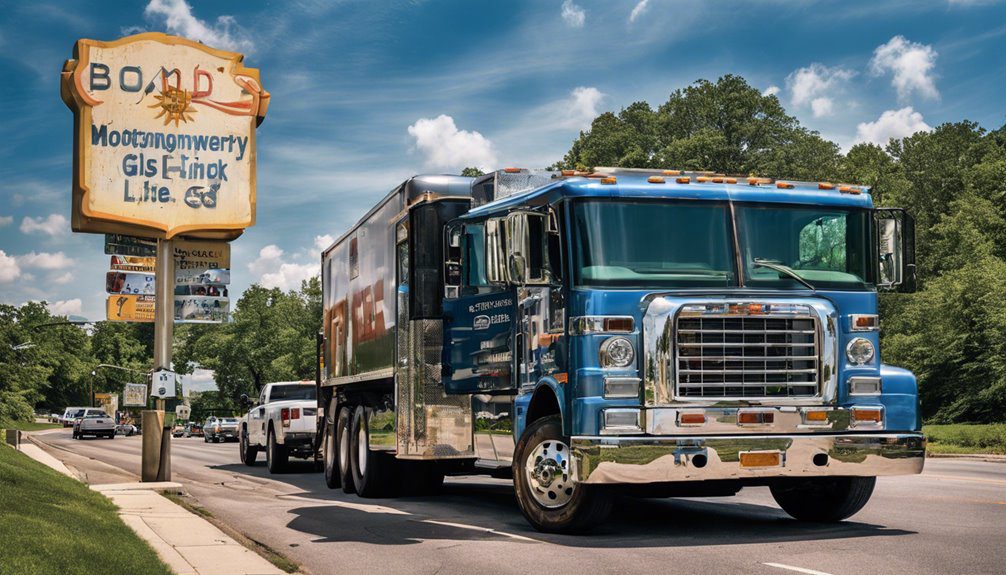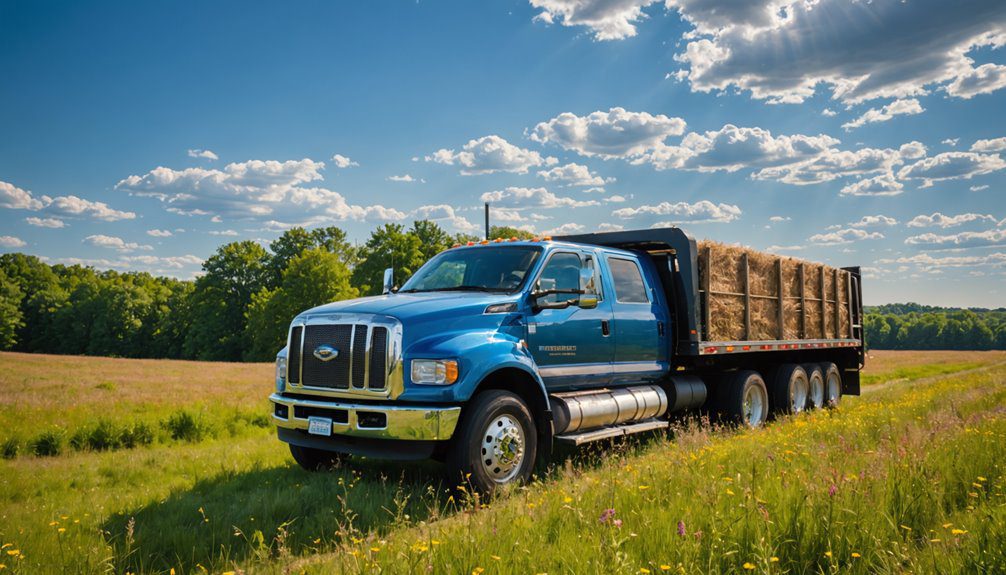If you operate an overweight or oversize vehicle in Montgomery County, TX, understanding the bond requirements is essential. This bond not only ensures compliance with local regulations but also protects your business from unexpected fines and damages. You may wonder what specific steps you need to take to secure this bond and maintain your driving privileges. Exploring the eligibility criteria, application process, and potential penalties can help you navigate these complexities more effectively. So, what are the key aspects you should be aware of to keep your operations running smoothly?
Understanding Vehicle Weight Regulations

Have you ever wondered how vehicle weight regulations impact your driving experience? These regulations are crucial in maintaining road safety and infrastructure integrity. They determine how much weight your vehicle can carry, which affects not only your vehicle's performance but also the overall safety on the road.
When you drive a vehicle that meets weight regulations, you enjoy improved handling, better fuel efficiency, and a smoother ride. It also minimizes the risk of damaging roads and bridges, which can lead to costly repairs and delays.
If you exceed these weight limits, you might face hefty fines, and your vehicle could suffer damage over time due to increased strain on tires and suspension systems.
Moreover, understanding these regulations helps you plan your trips better. Whether you're hauling cargo or transporting equipment, knowing your vehicle's weight limits can save you from unexpected obstacles.
You can avoid potential road closures or detours that could arise from weight restrictions on certain routes. Staying informed about these regulations ensures a safer driving experience for you and those around you.
What Is an Overweight Vehicle Bond?
An overweight vehicle bond acts as a safety net for both drivers and local authorities when it comes to complying with weight regulations. This bond is essentially a financial guarantee that ensures you'll adhere to local weight limits while operating your vehicle.
If you exceed these limits and cause damage to public roads or infrastructure, the bond provides a source of funds for that damage.
When you secure an overweight vehicle bond, you're promising to pay a specific amount if you violate weight regulations. It's not just a piece of paper; it's a commitment that helps protect your interests and those of the community.
Local governments require this bond to hold drivers accountable, ensuring that everyone plays by the rules.
In practice, obtaining an overweight vehicle bond often involves a fee based on the bond amount and your driving history.
Once you've obtained it, you can operate your overweight vehicle legally within designated limits. This bond can save you from hefty fines and legal issues, making it a crucial step for anyone planning to drive a vehicle that exceeds standard weight limits.
Importance of the Bond

The importance of an overweight vehicle bond can't be overstated, especially for those who frequently operate vehicles that exceed standard weight limits. This bond not only protects you but also helps ensure compliance with local regulations.
When you're driving an overweight vehicle, you're at a higher risk for fines and penalties if you don't have the proper documentation. Having a bond in place provides you with financial security. It guarantees that if you cause any damage to public property or if you violate local weight regulations, the bond will cover any resulting costs.
This protects your finances and your reputation as a responsible operator. Moreover, securing an overweight vehicle bond can facilitate smoother operations. It may be required by certain jurisdictions before you can obtain the necessary permits or licenses.
Without it, you might face delays or even be unable to operate your vehicle legally. In essence, this bond isn't just a legal formality; it's a vital safeguard for your business and peace of mind.
Eligibility Requirements
Understanding eligibility requirements for obtaining an overweight vehicle bond is vital for anyone looking to operate vehicles that exceed weight limits. To qualify, you must be a licensed operator in Texas, and your vehicle must be registered with the Texas Department of Motor Vehicles. Additionally, you should have proper insurance coverage that meets state mandates for your oversized vehicle.
It's essential to demonstrate that you have a valid purpose for operating an overweight vehicle. This could involve transporting goods, equipment, or materials that can't be reasonably divided or adjusted to meet standard weight limits.
Moreover, you must ensure that your vehicle complies with all applicable safety regulations. This includes having the necessary permits, ensuring your vehicle's maintenance is up to date, and adhering to local ordinances regarding oversized transport.
If you're a business owner, you may need to provide documentation proving your business's legitimacy, such as tax identification numbers or business licenses.
Meeting these eligibility requirements is a crucial step to avoid penalties and ensure smooth operations while using your overweight vehicle. Always double-check current regulations, as they can change and might impact your eligibility.
Application Process

Once you've confirmed your eligibility, you can begin the application process for your overweight vehicle bond. Start by visiting the Montgomery County website or the appropriate office that handles vehicle bonds. Look for the specific section related to overweight or oversize vehicle bonds; this will guide you to the necessary forms.
Next, fill out the application form completely. Make sure to provide accurate information about your vehicle and any pertinent details regarding your intended use. Double-check everything to avoid any delays in processing.
Once your application is filled out, you'll need to submit it along with the required fees. It's a good idea to pay attention to the payment methods accepted, as these can vary.
After submission, keep a copy of your application for your records. You may also have the option to track your application status online.
If you encounter any issues or have questions during the process, don't hesitate to reach out to the relevant office for assistance. Staying proactive will help ensure a smooth application experience and get you on the road with your overweight vehicle as soon as possible.
Required Documentation
Typically, you'll need to gather several key documents when applying for your overweight vehicle bond. First, ensure you have a copy of your vehicle registration. This document proves ownership and provides essential details about your vehicle.
Next, you'll want to include proof of insurance, demonstrating that you have the necessary coverage for your overweight vehicle.
Additionally, it's crucial to prepare a completed bond application form. This form may require specifics about your vehicle, including its weight and dimensions.
Don't forget to have your driver's license handy, as you'll need it to verify your identity. If you're operating a commercial vehicle, you might also need to present a copy of your commercial driver's license.
Lastly, check if you need any additional permits or documentation based on your specific situation. Local regulations may vary, so it's wise to reach out to your local authority or the bonding company for any unique requirements.
Bond Amounts and Fees

When applying for your overweight vehicle bond, you'll need to consider the bond amounts and associated fees. These amounts can vary based on the weight of your vehicle and the specific regulations in Montgomery County, Texas. Generally, the bond amount is calculated based on the excess weight of your vehicle over the legal limit. For example, if your vehicle is 10,000 pounds over the limit, you might need a bond amount that corresponds to that excess weight.
Additionally, you'll encounter fees during the application process. These fees can include administrative costs, processing fees, and any additional charges set by the bonding company. It's essential to review these costs thoroughly to ensure you're fully informed about the total financial commitment before proceeding.
Be aware that some bonding companies may offer different rates, so it's a good idea to shop around and compare options. This can help you find the most competitive prices while ensuring you meet all requirements.
Ultimately, understanding the bond amounts and fees will help you budget effectively for your overweight vehicle bond, allowing you to stay compliant and avoid any potential issues down the road.
Penalties for Non-Compliance
Failure to comply with overweight vehicle regulations can lead to significant penalties. If you're caught operating an overweight or oversize vehicle without the proper bond, you might face hefty fines. These fines can accumulate quickly, impacting your finances and your business's bottom line.
In addition to monetary penalties, you could also encounter delays in your operations. Authorities might impound your vehicle until you rectify the situation, costing you time and potentially disrupting your schedule.
Repeated violations can escalate the fines and lead to more severe consequences, including possible legal action.
Moreover, non-compliance can affect your driving record, leading to points that may increase your insurance premiums. This additional financial burden can be tough to manage, especially if you rely on your vehicle for work.
In short, it's crucial to stay informed about the regulations governing overweight vehicles in Montgomery County. Ensuring you have the correct bond in place not only saves you from penalties but also keeps your operations running smoothly.
Stay compliant to avoid unnecessary complications and focus on what you do best.
Renewing Your Bond

Renewing your bond is essential to keeping your operations compliant and avoiding unnecessary penalties. To ensure a smooth renewal process, start by checking the expiration date of your current bond.
It's crucial to initiate the renewal several weeks in advance to avoid any lapses in coverage. You'll need to gather the required documentation, which typically includes proof of insurance and any updated company information.
Contact your bonding agent or provider to confirm you have everything needed for the renewal. They'll guide you through any changes in the bond amount or conditions that may have occurred since your last renewal. Additionally, be aware that annual bond costs may differ based on jurisdiction and could affect your renewal fees.
Once you've submitted your renewal application and paid the necessary fees, keep an eye on the timeline. You should receive confirmation from your bonding company regarding the status of your renewal.
It's vital to follow up if you don't hear back within a reasonable timeframe.
Resources for Further Information
Understanding the requirements and processes surrounding vehicle bonds can sometimes be complex. Fortunately, there are several resources you can turn to for clarification. Start with the Montgomery County official website. It often contains the latest regulations and guidelines regarding overweight and oversize vehicle bonds, ensuring you have access to accurate and up-to-date information.
You might also want to connect with the Texas Department of Motor Vehicles (TxDMV). Their website has comprehensive resources and contact information if you have specific questions.
Additionally, local government offices can be invaluable. Don't hesitate to visit or call the Montgomery County Clerk's office, as they can provide direct assistance and answer your inquiries.
Consider joining online forums or local community groups where fellow vehicle owners share their experiences. These platforms can offer practical insights and tips that you won't find in official documents.
Conclusion
In Montgomery County, TX, understanding the Overweight or Oversize Vehicle Bond is essential for smooth operations. This bond not only protects you from hefty fines but also ensures you're compliant with local regulations. By following the eligibility requirements and completing the application process, you can secure your bond and keep your business running without a hitch. Don't overlook the importance of renewing your bond on time to avoid penalties. Stay informed and drive responsibly!

